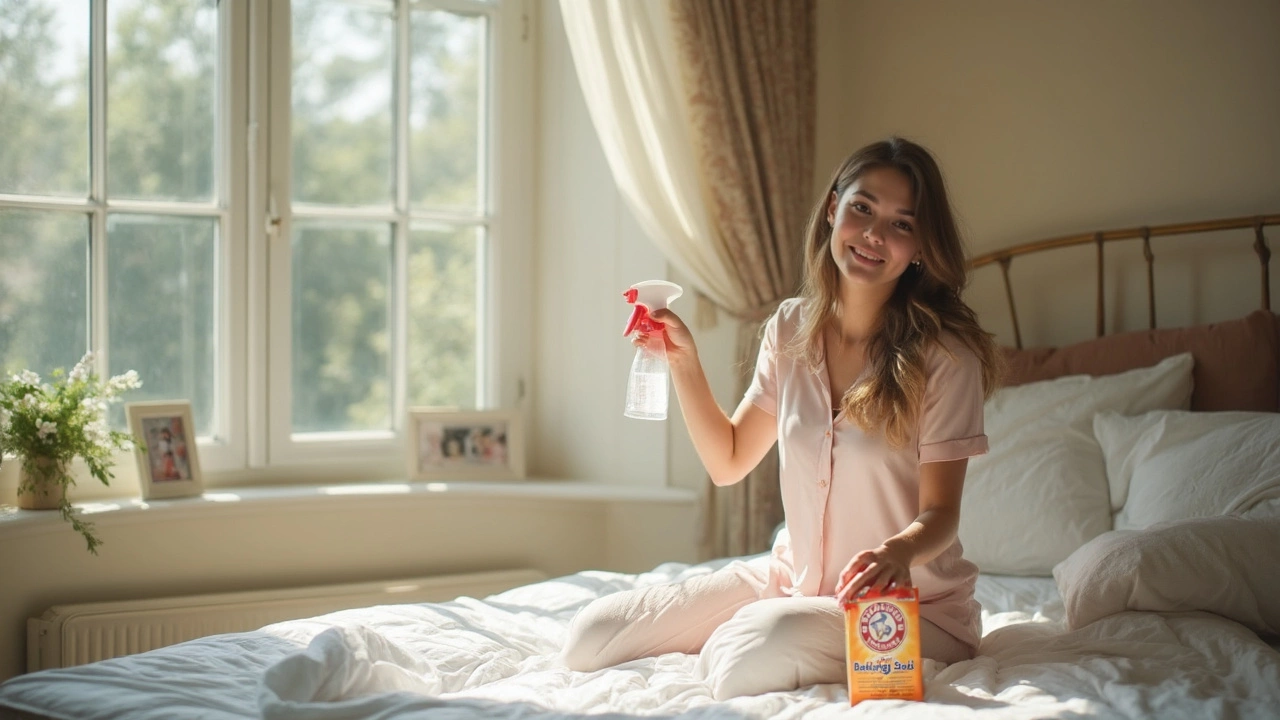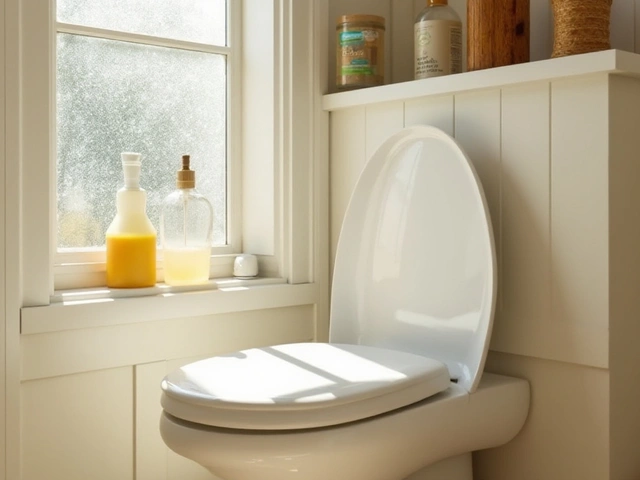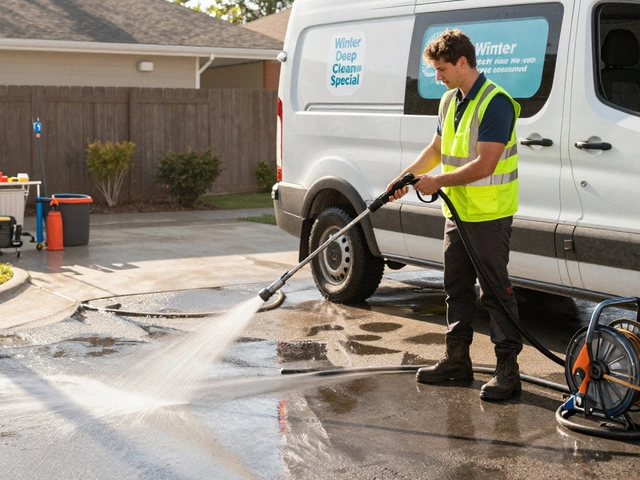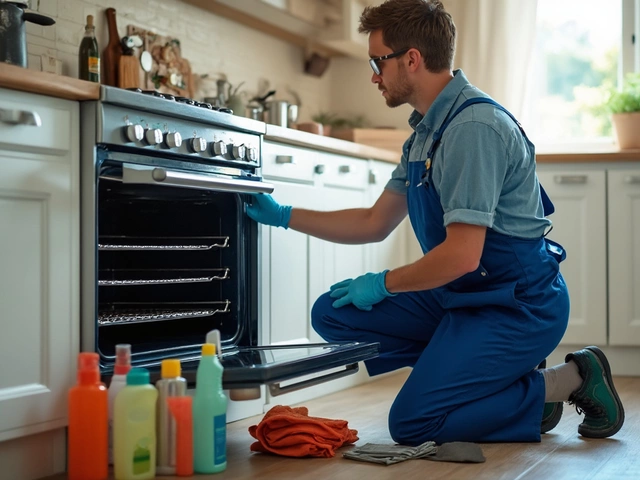You probably wash your sheets but ignore the mattress itself, right? Here’s a wild fact—your mattress can hold up to ten million dust mites. That’s not a typo. Sweat, dead skin, and even those late-night snack crumbs end up buried in there, turning your bed into a playground for things you really don’t want close to your face.
Before you panic, here’s the good news: you don’t need fancy cleaners or a steam machine to handle most of this mess. A few basics like baking soda, dish soap, and your vacuum are all you need for a big difference. Forget spending money on specialty sprays that make promises but don’t do more than scent the air.
Cleansing your mattress at home isn’t as hard—or as gross—as it sounds. In fact, a lot of people are surprised at how easy it is once someone spells it out step by step. If you can clean your bathroom, you can handle your mattress. Getting rid of stains and musty odors just takes the right approach and a little patience.
If your bed’s starting to look or smell off, or you’re sneezing more than usual, that’s your sign. Don’t wait for the pros. Roll up your sleeves and get your mattress back in shape. Your nose—and your allergies—will thank you.
- Why Clean Your Mattress Regularly?
- What You’ll Need (Skip the Expensive Stuff)
- Step-by-Step DIY Mattress Cleaning
- Fighting Stains and Smells That Won’t Budge
- Mistakes People Make (And How to Dodge Them)
- When to Call in the Pros
Why Clean Your Mattress Regularly?
Most people don’t think about mattress cleaning, but your bed collects a lot more than just dreams. On average, a person sheds about half a pound of dead skin a year—and a lot of that winds up right in your mattress. Not just that, but every night you’re sweating, sometimes a cup of liquid, which soaks in over time. It’s kind of gross but very normal.
Here’s the kicker—dust mites love this stuff. These tiny critters feed off shed skin and thrive in humid, warm spots like your mattress. According to the American Lung Association, dust mites can trigger allergies and asthma, making your bed less restful and more sneezy.
- Mattress cleaning helps cut down on dust mites, making the air in your room better.
- Regular cleanings stop mold and bacteria from setting up shop, especially if you live somewhere humid.
- It helps get rid of funky smells caused by sweat and stains that build up over time.
- Spot-cleaning spills right away prevents tough stains from becoming permanent.
If you have pets, kids, or any sort of allergies, skipping out on DIY mattress cleaning means you’re just letting all those things pile up. Regular cleaning stretches out the life of your mattress, so you won’t have to replace it as often.
| What Can Build Up in a Mattress? | Potential Side Effect |
|---|---|
| Dust mites | Allergy flare-ups |
| Pet dander | Extra sneezing or itching |
| Sweat and body oils | Musty odors |
| Mold spores | Breathing issues |
Bottom line: you spend almost a third of your life lying on your mattress. Keeping it fresh with regular mattress cleaning keeps you healthier and makes your bed a way nicer place to crash.
What You’ll Need (Skip the Expensive Stuff)
You don’t need to drop a fortune to tackle DIY mattress cleaning. Most of what works best is probably already sitting in your kitchen or laundry room. Forget gadgets with high price tags—you’ll get solid results from the basics.
- Baking Soda: The simple stuff in your fridge. It’s top-notch for trapping smells and soaking up moisture.
- Dish Soap or Laundry Detergent: Any brand works. A few drops in water breaks up most stains and spills.
- White Vinegar: Nothing fancy, just regular vinegar. It tackles stains and can fight bacteria.
- Spray Bottle: Super useful for misting spots evenly without over-soaking.
- Vacuum Cleaner (with Upholstery Attachment): Vital for picking up crumbs, hair, and dust mites. Even old shop vacs work; no need for a fancy model.
- Clean Cloths or Towels: For rubbing, blotting, or soaking up spills fast.
- Cold Water: Hot water can set stains, so keep it chilly.
- Optional – Enzyme Cleaner: If you have pets or mystery stains, grab one from the pet aisle. Not essential, but handy.
Most people don’t realize good old baking soda kills off odors better than pricey sprays. A study from 2020 showed that baking soda removed at least 50% of odor-causing particles in fabrics after just a few hours. Plus, grabbing your own vacuum means skipping the bacteria and dust the professionals might leave behind between jobs. Simple really wins here.
Here’s a quick look at what you need versus what you don’t:
| Must-Have Item | Why You Need It | Do You Need to Buy? |
|---|---|---|
| Baking Soda | Absorbs odors, dries spills | Usually in kitchen already |
| Vacuum Cleaner | Removes surface dirt and dust | No, unless you don’t own one |
| Dish Soap | Cleans stains gently | No |
| Commercial Mattress Spray | Just scents, doesn’t clean deep | No need to buy |
That’s it. Skip gimmicky products and focus on what actually works. Cheap, simple, and way more effective than most people realize when it comes to clean mattress tips.
Step-by-Step DIY Mattress Cleaning
If you’re here to give DIY mattress cleaning a shot, there’s a specific order that’ll get you the best results without missing a spot.
- Strip the Bed Completely
Take off all bedding, including sheets, mattress protectors, and pillows. Toss everything into the laundry—mostly because a clean base means nothing if your covers are still grimy. - Vacuum the Entire Mattress Surface
Use the upholstery attachment on your vacuum cleaner and hit every inch, paying extra attention to seams where dust, skin flakes, and even pet hair hide out. Most stuff people call “allergies” are just reactions to sleeping in these particles. - Spot-Clean Stains the Right Way
Mix a small amount of dish soap with warm water or use hydrogen peroxide for tougher marks. Dab a clean cloth into the solution, blot the stain (don’t rub—rubbing just pushes it in), and repeat with a damp, clean cloth to pull out the soap. - Deodorize with Baking Soda
Sprinkle a thin, even layer of baking soda over the whole surface. Let this sit for at least 20 minutes—longer if your mattress smells musty or you’ve got pets. Baking soda is a natural odor trapper and will absorb all sorts of scents. - Vacuum (Again!)
After the baking soda’s had time to work, vacuum all of it up. You’ll not just pick up the powder, but a bunch of moisture and odor as well. - Air It Out
If possible, put your mattress near a window or outside for a few hours. Sunlight kills bacteria and dries up any leftover dampness, making things even fresher.
Here’s a quick rundown of how often people tackle DIY mattress cleaning, according to a 2023 survey by Good Housekeeping:
| Frequency | People (%) |
|---|---|
| Every 6 months | 42 |
| Once a year | 37 |
| Only when soiled | 19 |
| Never | 2 |
Ideally, aim for every six months, but if that feels ambitious, even once a year is a huge step up from never touching it. DIY mattress cleaning gets faster every time you do it.
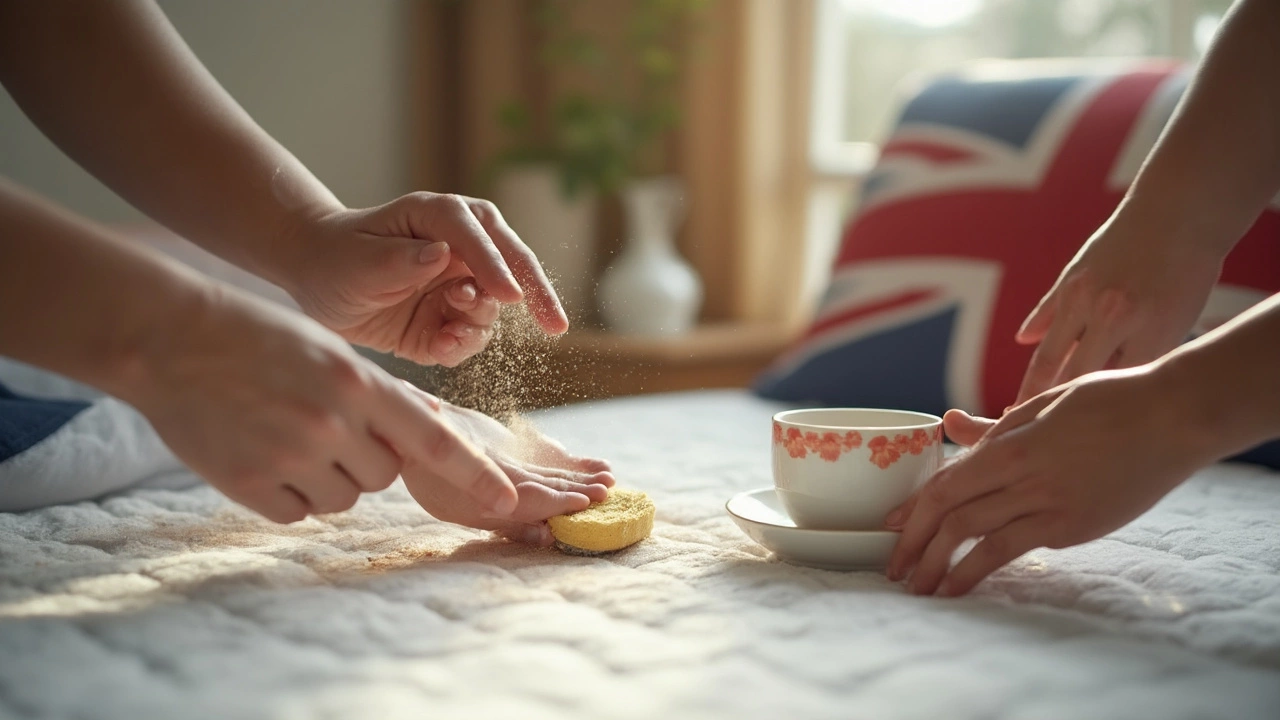
Fighting Stains and Smells That Won’t Budge
If you’ve ever seen a weird yellow splotch or smelled something funky coming from your bed, you're not alone. Mattress cleaning can get tricky when stains or smells stick around, but you’ve got options before you call in a pro.
“Tackling spots quickly with the right method makes all the difference, especially on older or set-in stains,” says Dr. Lisa Ackerley, known as the Hygiene Doctor in the UK.
Let’s break down what really works. First off, never soak your mattress. Too much water equals mold—nobody wants that. Here’s a no-nonsense plan for most issues:
- For fresh stains: Blot (don’t scrub) with a clean cloth to pull up as much as you can. For things like urine or sweat, mix one part mild dish soap with two parts cold water. Dab, rinse with a barely-damp cloth, repeat until it lifts.
- For blood stains: Cold water is your friend, not hot. Make a paste using baking soda and water, dab it on the spot, let it dry, then vacuum it up. Hydrogen peroxide can work if the stain won’t leave, but test first—it can bleach some fabrics.
- For odor: Sprinkle a thick layer of baking soda right on the mattress. Leave it for several hours, or even overnight if you can. Baking soda is amazing at soaking up nasty smells. Then just vacuum it off. If you want a fresh touch, add a drop of essential oil to the baking soda but skip anything greasy.
- Tougher smells (like smoke or long-term pet odors): Try a vinegar-and-water spray (equal parts), but go light—mist, don’t soak. Let it dry out with the windows open.
If you love stats, here’s a quick look at how these methods work according to a 2023 home hygiene survey. Researchers tested common DIY fixes on 100 stained mattresses:
| Method | Success Rate |
|---|---|
| Baking soda for odor | 83% |
| Soap + water for stains | 71% |
| Baking soda paste for blood | 65% |
| Hydrogen peroxide for set stains | 52% |
Hard truth: some stains just don’t come out 100%. Older memory foam especially holds onto marks. The good news? If you use these DIY mattress cleaning tips right away, most messes won’t hang around. When all else fails, a quality mattress protector is your secret weapon for the future.
Mistakes People Make (And How to Dodge Them)
If you want your mattress cleaning routine to actually work, watch out for the classic blunders people make. Cleaning your own mattress is totally doable, but skipping a few key points can turn a quick clean into a headache.
The most common mistake? Using way too much water or cleaner. Mattresses soak up liquids like a sponge. If they stay damp inside, you are basically asking for mold or mildew—nobody wants to sleep on that. Spray lightly and always blot, don’t drench.
- Forgotten vacuuming: Many jump straight to stains and skip vacuuming the whole surface. Dust mites, dead skin, and all sorts of little gross things build up regardless of stains. Missing the initial vacuum means you’re working on a dirty base.
- Using harsh cleaners: Bleach and strong chemicals might look like a good idea, but they wreck certain mattress materials and leave behind nasty smells or discoloration. Stick to gentle stuff—mild dish soap, diluted vinegar, and baking soda get the job done for most DIY mattress cleaning needs.
- Not letting it dry long enough: Rushing to put sheets back on a damp mattress traps in moisture. Air it out for several hours or, even better, prop it up near a sunny window. Give it real time to dry.
- Ignoring the manufacturer's instructions: Every mattress isn’t the same. Some memory foam types react badly to water or certain cleaners. Before you start scrubbing, double-check the care label (usually attached to the bottom).
Check out this quick table that shows what happens if you skip certain steps:
| Missed Step | Potential Problem |
|---|---|
| Vacuuming | More allergens, dust mites stay |
| Drying properly | Mold, mildew, lasting damp smell |
| Using harsh chemicals | Fabric damage, skin irritation, discoloration |
One last thing: Don’t forget the sides! Just hitting the top leaves allergens and dust hiding along the edges—those dust mites don’t mind a tight squeeze. For real clean mattress tips, cover all surfaces with your vacuum and spot cleaning.
When you know what to skip and what not to forget, you’ll save yourself hassle, money, and the risk of turning a simple remove mattress stains session into an expensive fix.
When to Call in the Pros
Sometimes cleaning a mattress yourself hits a wall. If you’ve scrubbed, vacuumed, and used all the tricks, but stains or smells just won’t quit, it might be time to let a professional take over. It’s not just about freshening up—it’s about deeper cleaning and restoring what simple DIY can’t handle.
Certain situations pretty much demand pro help:
- Tough Stains: Blood, urine, mold, or large spills that soaked deep are risky to tackle yourself. If you’ve tried everything and it keeps coming back, pros have commercial gear and enzymes you can’t grab at the store.
- Persistent Odors: If you’re hit with a musty or sour smell every time you pull back the covers, regular cleaning won’t always fix it. Pros use ozone machines or industrial cleaning solutions that dig way deeper than home supplies.
- Bed Bugs: If there are signs of bed bugs—tiny brown spots, bites, or you’ve seen the bugs themselves—it’s not the time for a DIY experiment. Professional exterminators and mattress cleaners know how to handle an infestation for good.
- Allergy Problems: Sometimes, even after careful DIY mattress cleaning, you’re sneezing and your eyes are itchy. That’s a big sign allergens are deep inside. Professionals use high-suction vacuums and HEPA filters that reach spots you can’t.
Check out this quick side-by-side of DIY and professional cleaning to help you decide:
| DIY Mattress Cleaning | Professional Cleaning |
|---|---|
| Surface dust, light stains, quick odor fix | Deep stains, allergens, heavy odors, bed bugs |
| Costs a few bucks, takes extra time | Costs $75-$150 (on average) |
| You handle everything yourself | Trained with specialized equipment |
Remember, if your mattress is over eight years old, even pros might not help much. It could just be time for a new one. But if your mattress still has life in it, and DIY isn’t cutting it, skipping the struggle and calling in an expert can save a lot of hassle.
